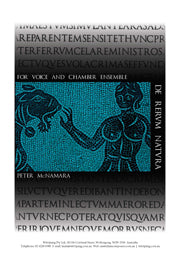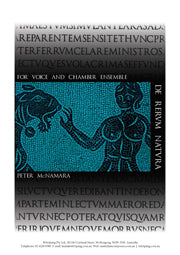Peter Mcnamara
De Rerum Natura
De Rerum Natura
Couldn't load pickup availability
Share
 Voice and chamber orchestra
Voice and chamber orchestra
De Rerum Natura is a 6-part song cycle setting portions of Titus Lucretius Carus’ same-titled 6-volume ancient Latin literary work, completed in c. 50-5 BCE. De Rerum Natura can be translated as The Nature of Things, and is a sophisticated didactic text explaining the world around us, consisting of poetry, prose and scientific theory of the antiquity. Lucretius outlines the flaws as he sees them in ancient religion, that the souls of men are mortal and the world made up of infinite fine particles, using a similar text written 200 years previous by ancient Greek philosopher Epicurus (341-270 BCE) as a model. The text is pronounced according to the principles of classical pronunciation, which is how linguists believe that Latin was spoken in ancient Rome.
The six movements of De Rerum Natura, are divided into two related groups of three movements (1, 2, 3 and 4, 5, 6). The first song has a very flowing character while the second is much more rhythmically driven and tense. The fourth song is related to the first harmonically, but with the tense and rhythmically driven character of the second. The fifth song meanwhile is related to the second harmonically, but with the flowing character of the first. The third and sixth songs are also closely related by way of their rhythmically free and semi-improvised character, creating two related yet contrasting overall divisions of the song cycle.
Composed 2018-20
Download samples
ISMN 9790720231693



